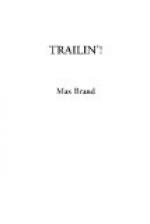“I ask you,” cried Lawlor, with freshly risen wrath, “is that any way to go around talkin’ about women?”
“Not talking. He’s singing,” answered Bard. “Let him alone.”
The thunder of their burly Ganymede’s singing rose and echoed about them.
“And this shall be my
knell, be my knell;
And this shall be my
knell—my knell.
And this shall be my
knell:
’Sam, I hope you go
to hell,
Sam, I hope you sizzle
well—
Damn your
eyes!’”
Shorty Kilrain appeared in the doorway, his mouth wide on the last, long, wailing note.
“Shorty,” said Lawlor, with a sort of hopeless sadness, “ain’t you never been educated to sing no better songs than that?”
“Why, you old, grey-headed—” began Shorty, and then stopped short and hitched his trousers violently.
Lawlor pushed the bottle of whisky and glass toward Bard.
“Help yourself.” And to Kilrain, who was leaving the room: “Come back here.”
“Well?” snarled the sailor, half turning at the door.
“While I’m runnin’ this here ranch you’re goin’ to have manners, see?”
“If manners was like your whiskers,” said the unabashed Shorty, “it’d take me nigh onto thirty years to get ’em.”
And he winked at Bard for sympathy.
Lawlor smashed his fist on the table.
“What I say is, are you running this ranch or am I?”
“Well?” growled Kilrain.
“If you was a kid you’d have your mouth washed out with soap.”
The eyes of Shorty bulged.
“It ought to be done now, but there ain’t no one I’d give such dirty work to. What you’re going to do is stand right here and show us you know how to sing a decent song in a decent way. That there song of yours didn’t leave nothin’ sacred untouched, from parsons and jails to women and the gallows. Stand over there and sing.”
The eyes of the sailor filmed over with cold hate.
“Was I hired to punch cattle,” he said, “or make a blasted, roarin’ fool out of myself?”
“You was hired,” answered Lawlor softly, as he filled his glass to the brim with the old rye whisky, “to be a cook, and you’re the rottenest hash-slinger that ever served cold dough for biscuits; a blasted, roarin’ fool you’ve already made out of yourself by singin’ that song. I want another one to get the sound of that out of my ears. Tune up!”
Thoughts of murder, ill-concealed, whitened the face of the sailor.
“Some day—” he began hoarsely, and then stopped. For a vision came to him of blithe mornings when he should sit on the top of the corral fence rolling a cigarette, while some other puncher went into the herd and roped and saddled his horse.
“D’you mean this—Drew?” he asked, with an odd emphasis.
“D’you think I’m talking for fun?”
“What’ll I sing?” he asked in a voice which was reduced to a faint whisper by rage.




